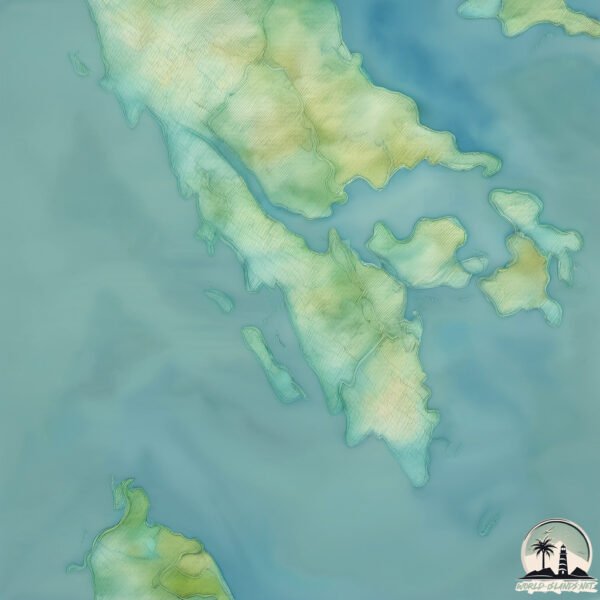Pulau Galang Baru

Welcome to Pulau Galang Baru, a Tropical island in the South China Sea, part of the majestic Pacific Ocean. This guide offers a comprehensive overview of what makes Pulau Galang Baru unique – from its geography and climate to its population, infrastructure, and beyond. Dive into the details:
- Geography and Size: Explore the island’s size and location.
- Climate and Weather: Weather patterns and temperature.
- Topography and Nature: Uncover the natural wonders of the island.
- Infrastructure and Travelling: Insights on reaching, staying, and making the most of your visit.
- News and Headlines: Latest News.
Geography and size of Pulau Galang Baru
Size: 31 km²
Coastline: 50.7 km
Ocean: Pacific Ocean
Sea: South China Sea
Continent: Asia
Pulau Galang Baru is a Medium Island spanning 31 km² with a coastline of 51 km.
Archipel: Greater Sunda Islands – A group of large islands in Southeast Asia, including Borneo, Sumatra, Java, and Sulawesi, known for their rich biodiversity and cultural diversity.
Tectonic Plate: Sunda – Extends across Southeast Asia, encompassing parts of the Sunda Shelf, known for its interaction with the Australian Plate, contributing to volcanic activity in Indonesia.
The geographic heart of the island is pinpointed at these coordinates:
Latitude: 0.66548045 / Longitude: 104.25606448
Climate and weather of Pulau Galang Baru
Climate Zone: Tropical
Climate Details: Tropical Rainforest Climate
Temperature: Hot
Climate Characteristics: This climate is typified by heavy rainfall throughout the year, high humidity, and consistently high temperatures, leading to lush rainforests and rich biodiversity. Seasonal temperature variations are minimal.
Topography and nature of Pulau Galang Baru
Timezone: UTC+07:00
Timezone places: Asia/Jakarta
Max. Elevation: 42 m
Mean Elevation: 19 m
Vegetation: Evergreen Broadleaf Forest
Tree Coverage: 57%
The mean elevation is 19 m. The highest elevation on the island reaches approximately 42 meters above sea level. The island is characterized by Plains: Flat, low-lying lands characterized by a maximum elevation of up to 200 meters. On islands, plains are typically coastal lowlands or central flat areas.
Dominating Vegetation: Evergreen Broadleaf Forest
Characterized by dense, lush canopies of broadleaf trees that retain their leaves year-round. These forests are typically found in tropical and subtropical regions and are known for their high biodiversity. Pulau Galang Baru has a tree cover of 57 %.
Vegetation: 12 vegetation zones – Exceptionally Diverse Island
Islands with more than ten vegetation zones are among the most ecologically rich and varied in the world. These islands are akin to miniature continents, boasting an incredible array of ecosystems. The sheer range of habitats, from high peaks to deep valleys, rainforests to deserts, creates a mosaic of life that is unparalleled. They are crucial for conservation and ecological studies.
Infrastructure and Travelling to Pulau Galang Baru
Does the island have a public airport? no.
There is no public and scheduled airport on Pulau Galang Baru. The nearest airport is Raja Haji Fisabilillah International Airport, located 40 km away.
Does the island have a major port? no.
There are no major ports on Pulau Galang Baru. The closest major port is TANJUNGPINANG, approximately 33 km away.
The mean population of Pulau Galang Baru is 1877 per km². Pulau Galang Baru is Densely Populated. The island belongs to Indonesia.
Continuing your journey, Pulau Galang is the next notable island, situated merely km away.
Trans Barelang Towards Galang Baru Island - Batam City Street



Indonesia is classified as Emerging region: MIKT: Mexico, Indonesia, South Korea, and Turkey – Economies recognized for their development potential and emerging market status. The level of income is Lower middle income.
News – Latest Updates and Headlines from Pulau Galang Baru
Stay informed with the most recent news and important headlines from Pulau Galang Baru. Here’s a roundup of the latest developments.
Please note: The data used here has been primarily extracted from satellite readings. Deviations from exact values may occur, particularly regarding the height of elevations and population density. Land area and coastline measurements refer to average values at mean high tide.
